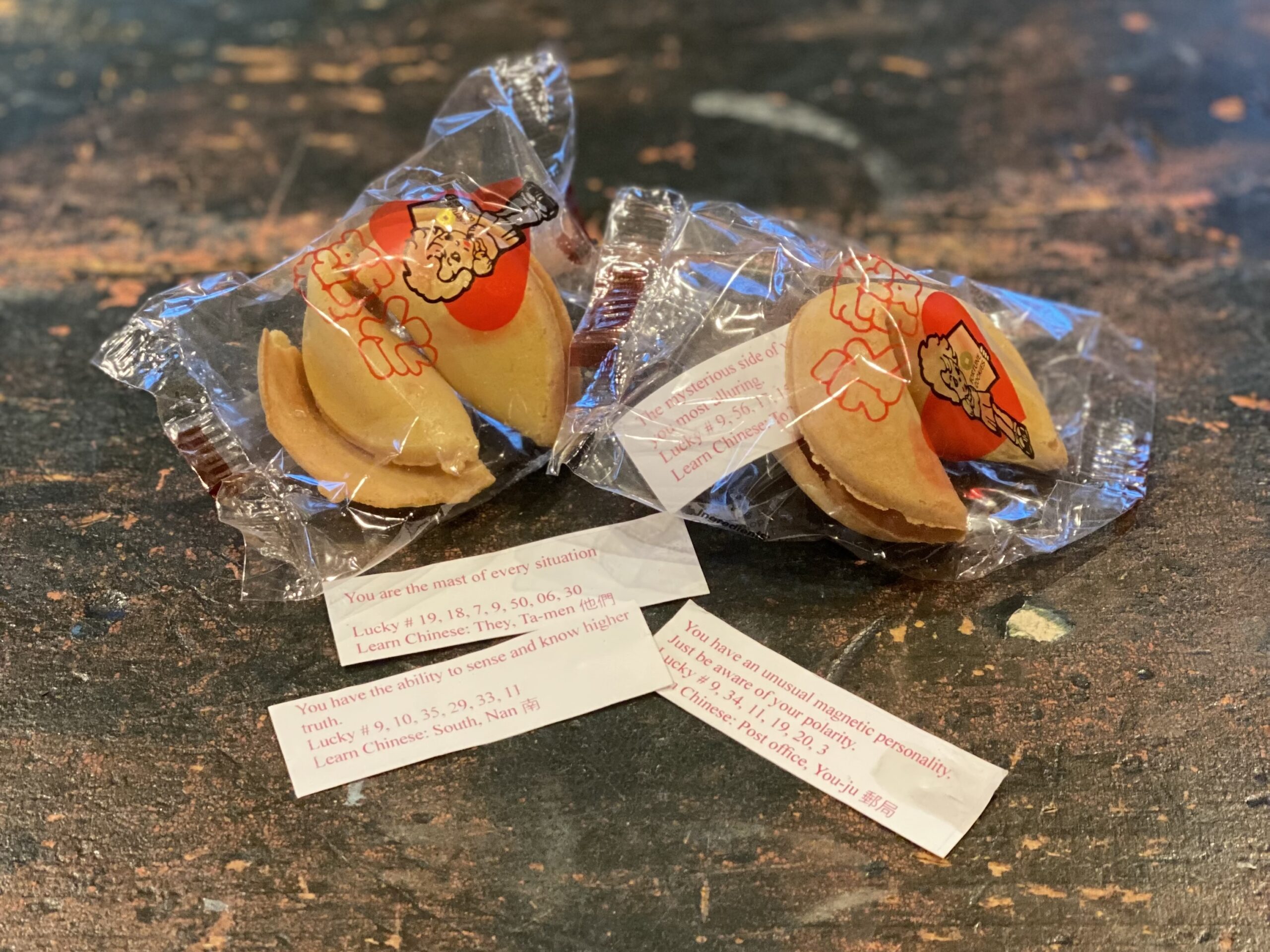I was at Walmart, at the customer service desk. Two peopl messing with the printer, and a woman helping another customer. The woman had to leave the desk to help a customer out in the store. As she left I heard her say, “God freakin’ help you, hon.”
So, I stood there, with my mouth hanging open, wondering WHY ON EARTH she would say that to me? I know Walmart customer service is often bad, but really? Then I turned to the guy working on the printer and saw his name tag. His name was Godfrey.
For almost a decade, I’ve laughed about this tale which belongs to my friend, Stephanie (shared with permission). We’ve all been there—hearing things that weren’t said, saying things that weren’t meant.Like the night my pseudo sous chef thought I said we were having snake for dinner.Or the story I read about someone asking a new roommate if they enjoyed watching p*rn movies when they were actually asking about foreign (“for’n”) movies. Or the long conversation I had with a woman about her Westy and how much we both loved them. It wasn’t until I told her ours was red that she gave me a funny look. She’d never heard of that color, while I thought of it as common. That was the point when we realized she’d been talking about her West Highland Terrier, and I’d been talking about our old Volkswagen Westfalia. I miss that ride.
-

Our beloved (and long gone) Westy
These mix-ups ended with hearty chuckling and some great anecdotes, but can you imagine the seismic shift that might have been provoked with a subtle change in tone?
God freakin’ WHAT??!
Everyday, we stand on countless interpersonal fault lines, babbling Rings of Fire on the brink of conversational disaster. When things get wobbly, most of us manage to keep our shit together—stabilizing, soothing, regrouping. Except when we don’t. Then, shots are fired, and someone ends up getting hurt. Though we can’t predict what another person will bring to a discussion, generally speaking, we know how to play nicely in the sandbox, or how to not run with verbal scissors. It boils down to basic stuff we’ve been taught repeatedly.
Listen more. Talk less. Ask clarifying questions. Choose words thoughtfully.
-

From the Coaching Tools Company
Probably, we heard it first as a short axiom: Think before you speak. More recently, a version called T.H.I.N.K. has surfaced.
- T = Is it true?
- H = Is it helpful?
- I = Is it inspiring?
- N = Is it necessary?
- K = Is it kind?
While I haven’t been able to pinpoint when it came into being or who authored it, like its older cousin, it is meant to help us help ourselves, and others by association. The newer one seems to appear most often in educational settings, LinkedIn essays, and Pinterest images. One site calls it an acronym for kinder, more effective communications. I’d argue that it’s more of a mnemonic device than an acronym, but I suppose I shouldn’t be arguing at all, considering. You see how this goes?
In truth, nothing here is new. Tenets very similar to these were set down in a Victorian-era poem in 1872, and in the Buddhist Pali Canon, nearly 2,000 years earlier.
Monks, a statement endowed with five factors is well-spoken, not ill-spoken. It is blameless & unfaulted by knowledgeable people. Which five?
“It is spoken at the right time. It is spoken in truth. It is spoken affectionately. It is spoken beneficially. It is spoken with a mind of good-will.” — Anguttara Nikaya 5.198
Think. Before. You. Speak.
It is a topic I keep coming back to. If practice really did make perfect, I’d be the shiniest, most flawless example of perfection this side of the Mississippi. Maybe both sides. In reality, nothing could be farther from the truth. With greater frequency than I wish, I am a bumbling, fumbling, foot-in-mouthed numpty. And that doesn’t count the times I’ve been utterly unaware of my blunders. I bet my husband could help me tally up some of those. I’m at expert level in the slow learner’s game.
Evidently, holding back on verbal projectiles is a lifelong lesson, for me anyway. But we all know communication can get even messier when we take it to the virtual realm. Though the ‘think first’ principle still applies, the likelihood of flawed interactions increases when we’re on an electronic device. All those typos, the lack of punctuation, disjointed timelines, and anonymity are like dropping a Mark-77 on an arsenal of dormant missiles. It’s called the online disinhibition effect which, in laypeople’s terms, means if I’m communicating through a screen, I’m much more inclined to become an asshat.
In recent past, I found myself immersed in reactions to a post on Civil Discourse with Joyce Vance. One participant took exception to parts of the original essay and to several comments that followed. They shared their disagreements repeatedly. Their name turned up so often that I started to suspect a troll. (Do we still call them that? Or is that disrespectful to trolls? Serious question.)
But there was more to this person. There was evidence of respect. There was an admission of being in post-operative pain. Amid the dissent and cynicism was an earnestness and something that felt like sadness. Several people, who only saw the former, wrote back with sharp, dismissive comments. Others tried to find points of agreement. One respondent stood out from the rest. He noted their shared experience as disabled military veterans and built his remarks from there.
The tone of the disgruntled individual shifted markedly. Finally, someone who understood! Finally, someone willing to notice and connect! The exchange nearly brought me to tears.
Respondent: Look at my profile–disabled vet like you. I “low crawl” in bed every night. I get VA counseling every week to get my head tuned up. I feel the same way you do. I see it coming. I am majorly frustrated by how any veteran or active duty can [believe that way] and how the weapon we used professionally is easily available to anyone. Or how, in a dark future, our active duty brothers and sisters will be deployed against Americans!
Please, please, don’t become a casualty a second time. WE NEED YOU! Pull it together Troop–fall in, the enemy is in the wire!
p.s. I got the cats too. They got me through a year and half total lock-down.
Respondent: Use your anger, man. That’s how I got out of my chair. The batteries are long dead, and the van is gone. I replaced it with a 25 year old pickup that somehow, by God, I get into and out of (but the bed, no way!)
There’s lots of energy in anger. Welcome Home….
Frustrated commenter…what a great couple of replies! Thanks for reminding me of the camaraderie I miss every day.
Perception changes everything. Where we notice value, we direct attention. Where we direct attention, we notice value. This is the symbiosis in civil discourse. This is the genesis of cooperation. This is how we make space for our differences and for what we have in common.
Godfrey can help us.
-

Photo by youssef naddam on Unsplash
Elizabeth Beggins is a communications and outreach specialist focused on regional agriculture. She is a former farmer, recovering sailor, and committed over-thinker who appreciates opportunities to kindle conversation and invite connection. On “Chicken Scratch,” a reader-supported digital publication hosted by Substack, she writes non-fiction essays rooted in optimism. To receive her weekly posts and support her work, consider becoming a free or paid subscriber here.






































